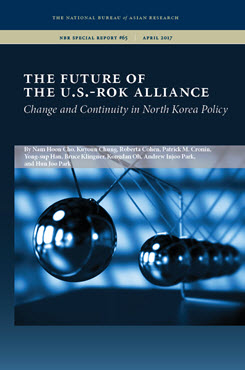Avoiding Calamity
Preparing for a North Korean Collapse
This essay examines possible collapse scenarios for North Korea, considers the expected responses of regional stakeholders, and offers policy suggestions for the United States and the Republic of Korea (ROK).
EXECUTIVE SUMMARY
MAIN ARGUMENT
Despite the United States’ attempts to achieve the denuclearization of the Democratic People’s Republic of Korea (DPRK) by promising security assurances and providing aid packages, it appears increasingly likely that the DPRK will not give up its nuclear weapons program, regardless of what external actors offer. As long as the two Koreas are unlikely to unite under present conditions, the collapse of the Kim Jong-un regime is arguably a precondition for unification. In analyzing possible collapse scenarios, Kim’s incomplete consolidation of power, North Korea’s enhanced market mentality, and its worsening relationship with China, among other factors, should be considered. As Bruce Bennett and Jennifer Lind highlight, there are at least “five principal military missions” that need to be executed in case of such a collapse: (1) stability operations, (2) border control, (3) elimination of weapons of mass destruction, (4) disarmament of conventional weapons, and (5) defeat of resisting forces. However, reflecting the fact that regional stakeholders lack coordination and consent to perform joint maneuvers in the event that the North Korean regime collapses, the future looks very stark in any of the possible scenarios.
POLICY IMPLICATIONS
The U.S.-ROK alliance should consider adopting the following policy objectives to prepare for an efficient transition in the aftermath of a collapse of the Kim regime:
- Find a way to maintain consistency in North Korea policy
- Ease Chinese concerns about Korean unification to achieve Beijing’s assent by promising economic benefits and the protection of Chinese nationals in a unified Korea
- Gain international support to better manage the financial burden of unification by signing memoranda of understanding that will guarantee the immediate provision of substantial loans at the appropriate time


